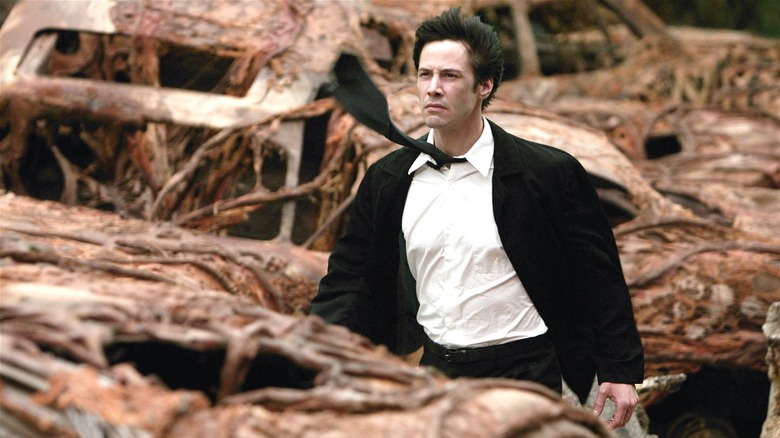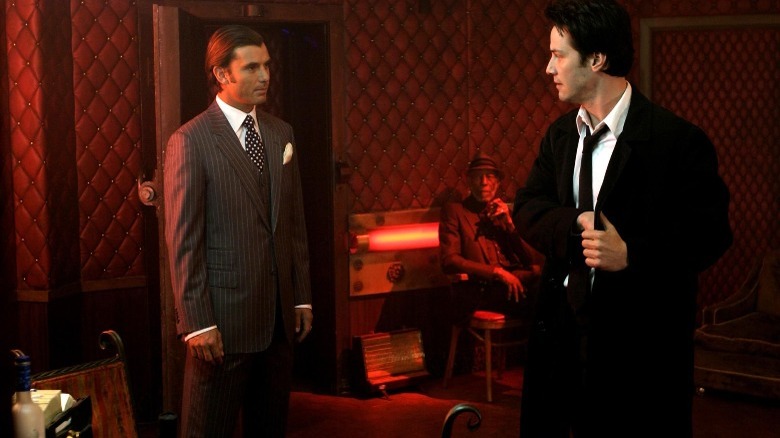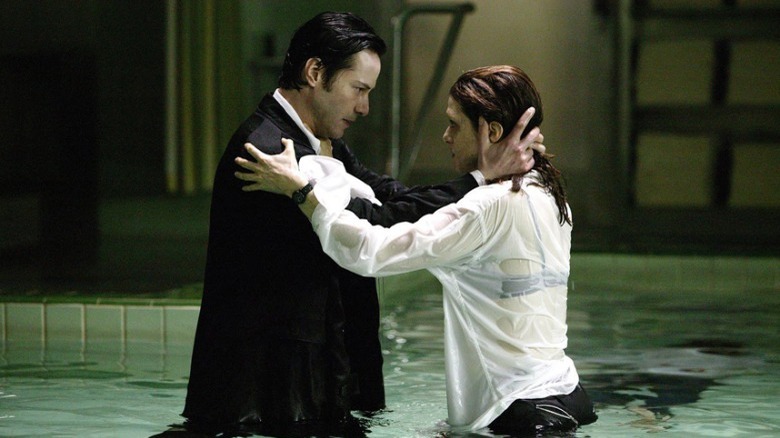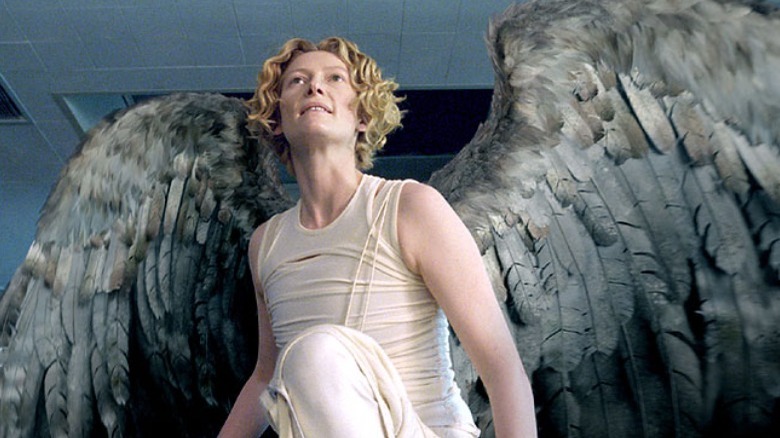Constantine Ending Explained: He Works His Work In Mysterious Ways
For occult expert John Constantine (Keanu Reeves), exorcising demons on a freelance basis is as mundane as it gets. Intensely cynical and acutely aware of his loneliness, Constantine is forever caught in a war between Heaven and Hell, jilted by God and loathed by demons. However, Constantine's motive to do what he does is not entirely selfless: He's a dying man who has been marked for Hell, trudging through life and experiencing unimaginable horrors. He is as burnt out as the endless chain of cigarettes he smokes, while he takes on cases that require his expert occult knowledge and effortless prowess.
Such is the plot of Francis Lawrence's 2005 directorial debut, "Constantine," which features a beloved Vertigo/DC Comics character who had little in common with his comics counterpart. Although the film received mixed critical reviews at the time of its release, "Constantine" has (rightfully) garnered a cult following over the years due to the bleak, unique vision it has to offer. Apart from the terrifying half-breed demons that connive their way into infiltrating Earth, "Constantine" is driven forward by a protagonist who has no interest in saving the world. However, in the end, he ends up doing just that.
Now that a "Constantine" sequel is finally in the works (with Reeves reprising the titular role), let's look at the ending of Lawrence's superhero horror film, its endless unconventionalities, and what makes the film special even among modern comic book movies.
Hell is empty and all the devils are here
The world-building of "Constantine" is tinted in extremes from the get-go, as the film begins with the retrieval of the Spear of Destiny and the exorcism of a little girl. Constantine arrives on the scene, snarky and disheveled, but soon notices that this isn't a run-of-the-mill exorcism. Demons are attempting to use humans as "finger puppets" to roam the Earth, which is in direct violation of the treaty between Heaven and Hell. A conventional heroic figure would immediately take on the burden to selflessly stop this from happening. But Reeves' Constantine is only interested in saving his own soul while figuring out his complicated relationship with his own existence.
Enter Angela Dodson (Rachel Weisz), who is investigating the death by suicide of her twin sister Isabel when she seeks out Constantine's help. Although he is initially uninterested, this acts as a catalyst for Constantine's journey toward possible salvation, which oscillates between earned and unearned. Hardboiled noir intersects with full-blown supernatural horror as Angela and Constantine battle legions of demons while trying to understand what led to Isabel's death. When the antichrist Mammon possesses Angela, the forces of Heaven and Hell reveal their true colors, with Constantine acting as the connective tissue.
Every other character in the film, including alcoholic priest Father Hennesy (Pruitt Taylor Vince) and witch doctor Papa Midnite (Djimon Hounsou), are at the mercy of cosmic forces. There is no space for warm, fuzzy feelings in this world, which is being torn apart by angels and demons in a game to gain the upper hand.
The bringer of order out of chaos
Constantine's fate is directly connected to his relationship with the forces that surround him. His constant world-weary nature stems from his ability to see supernatural entities since he was a child, which proves to be a double-edged sword. Nobody should have to bear such a heavy burden as Constantine, whose immense knowledge about the unknown alienates him from others and himself. The concept of a "normal life" is unthinkable for him. He even says so during a conversation with Midnite, wherein he views any sort of normalcy as a blessed, blissful feeling he can never embody.
Although Constantine's actions are mostly driven by self-preservation, he's also prone to an incredible amount of self-loathing. Despite having the power to save mankind, he never indulges in superhero-ing or ego-fueling savior fantasies. He does not seek salvation but only wishes to be spared an eternity in Hell, which is depicted as a barren, soulless nuclear blast site filled with agony. Even Gabriel (Tilda Swinton) who is later revealed to be a cold, disillusioned antagonist, remarks at one point that acts of atonement driven by selfish reasons cannot find a place in Heaven. Determined to evade Hell, Constantine trudges on.
Then, the impossible happens. Constantine slashes his wrists with the intention of bringing the Devil to Earth, who loathes him enough to collect his soul personally. A tense barter ensues, and Constantine convinces Lucifer to banish Mammon to Hell, which saves Angela's life. However, instead of asking for his own salvation, he asks for Isabel's. This act of selflessness earns him a place in Heaven, but he is dragged back to Earth, cured of cancer, due to the Devil's spite. The cruelties of life still torture John Constantine, who can never escape his role as the reluctant anti-hero.
The Apocalypse is not averted, but delayed
When Constantine meets Angela, he dismisses her rudely, as he is uninterested in an investigation of a personal, emotional nature. On learning about her latent powers, Constantine helps Angela awaken her abilities, and this puts them on a path to her being possessed by Mammon. Although Constantine genuinely seems to care about Angela after a point, Mammon's presence acts a bargaining chip for Constantine, as it offers a window of opportunity. However, after Chas Kramer (Shia LaBeouf) is killed by Gabriel, Constantine experiences intense personal loss. Throughout the film, Constantine seems to believe that he is immune to caring about others, but the tragedy of Chas' death and his selfless sacrifice awakens something in him. Also, the potential death of Angela drives him to desperation, which leads to the epic Constantine-Lucifer confrontation in the movie.
In the film's post-credits scene, Constantine visits Chas' grave, lamenting that he had such little faith in his only friend. After he leaves, Chas appears as an angel, donning garment similar to Gabriel, who is now a mortal. The significance of this scene is tragic in terms of Constantine's fate. He will now be forced to engage with Chas on completely different terms amidst the possibility of the world ending once again. Is it possible that Chas has awakened to perform the same duties as Gabriel, who viewed mankind as mere pawns? As Gabriel was the one who had facilitated Mammon's possession of Angela, the implication of Chas taking on this new mantle is troubling.
To have to deal with an old friend, now completely transformed, is a burden only Constantine has to carry. Now that he is forced to live on, Constantine's personal hell, which bleeds into his work and existence, will only be intensified.



